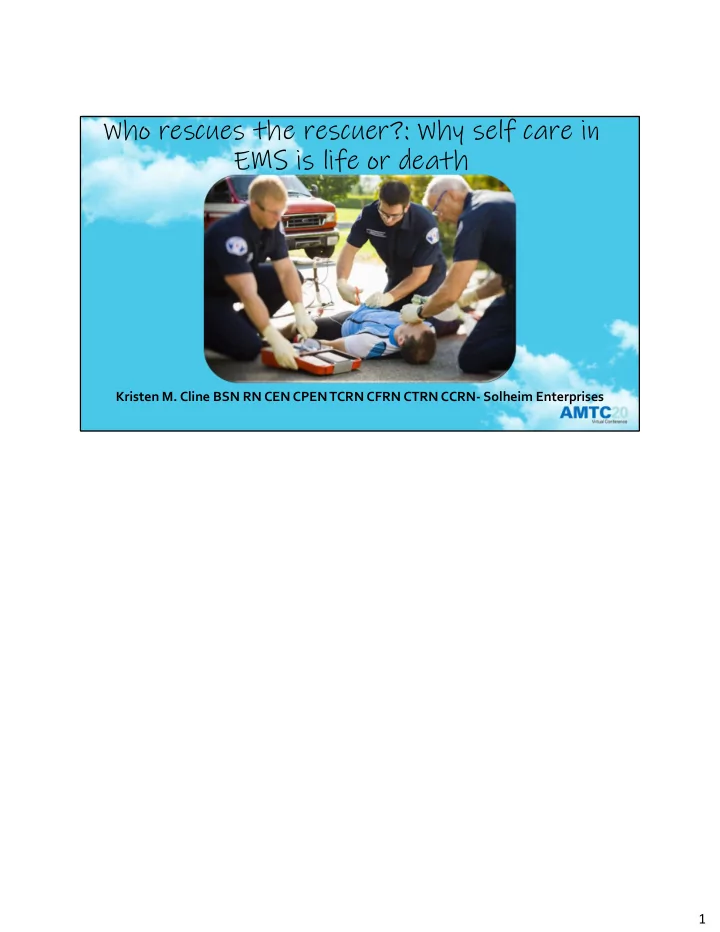

Who rescues the rescuer?: Why self care in EMS is life or death Kristen M. Cline BSN RN CEN CPEN TCRN CFRN CTRN CCRN- Solheim Enterprises 1
2
3
Adverse Childhood Experiences Study (ACE) 4
• Abuse • Emotional • Physical • Sexual 5
• Household challenges • Mother treated violently • Substance abuse in the household • Mental illness in the household • Parental separation or divorce • Incarcerated household member 6
• Neglect • Emotional neglect • Physical neglect 7
Study findings of note- prevalence 8
ACEs and health implications • 9
ACEs and health implications • 10
ACEs and health implications 11
12
Generational trauma • Epigenetic changes d/t trauma are now believed to be inherited • Children of survivors suffer mortality effects of traumatic events even if they didn’t personally experience them • Documented in civil war soldiers • Holocaust survivors • Somalian refugees • Native Americans • African Americans 13
Generational trauma 14
15
16
17
18
Trauma informed care • Trauma is common, multifactorial, and affects ALL patients • Patients are vulnerable: power discrepancy may trigger a trauma response • Reactions of anger may be manifestations of fear/anxiety related to trauma • Many chronic illnesses can be traced back to trauma • Caregivers have their own complex history of trauma that may affect the care provided to patients in acute crisis 19
Secondary traumatic stress 20
21
Vicarious traumatization • Exposure to the traumatic experiences of other people • An inevitable occupational challenge for the field of victim services • Effects are insidious and cumulative 22
Secondary Traumatic Stress • Sometimes known as ‘compassion fatigue’ • Definition- ‘the natural consequent behaviors resulting from knowledge about a traumatizing event experienced by another. It is the stress resulting from helping or wanting to help a traumatized or suffering person’ • Can be exacerbated by the caregiver’s own personal traumatic experiences • Burnout - results from long term non-supportive work environments, exposure to other people’s trauma is not the precipitating factor 23
Symptoms of STS • 70% of care providers experienced at least one symptom in past week • Fatigue, illness, cynicism, irritability, reduced productivity, feelings of hopelessness, anger, despair, sadness, nightmares, anxiety, avoidance of people or activities, persistent anger/sadness • Effects at work- increased sick leave, low morale, less effective workers 24
• Loss of pleasure that your role had previously brought • Inability to maintain balance of empathy and objectivity (becoming over-involved with patients) • Increased irritability and blaming of others (including patients) • Diminished sense of personal accomplishment • Overly high expectations of self or others • Decreased ability to feel joy 25
• Feeling ineffectual and less capable • Feelings of hopelessness • Chronic lateness • Ineffective and/or self-destructive coping strategies (working even harder, drinking, etc) • Lowered functioning in non- professional situations (less socially competent, less interested and engaged in normally pleasurable activities) 26
27
28
29
Self care • Access Employee Assistance Program • Online counseling services • Better Help • Talk Space • Start small- choose one self care activity to commit yourself to • Learn to say ‘no’ (including OT) • Support each other, reach out if someone seems to be struggling • Regular check ins with staff and colleagues, debriefings • Use your PTO! • Listen to your body- sleep and rest if you need to 30
31
@traumainformednurse 32
Take care of each other! traumainformednurse@gmail.com 33
Recommend
More recommend